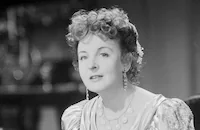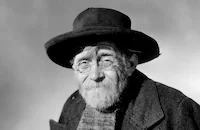Tovarich
Brief Synopsis
Cast & Crew
Anatole Litvak
Claudette Colbert
Charles Boyer
Basil Rathbone
Anita Louise
Melville Cooper
Film Details
Technical Specs

Synopsis
Two Russian exiles, Tatiana, the Grand Duchess Petrovna and Mikail, Prince Ouratieff, have settled in Paris, bringing with them forty million francs smuggled out of Russia. They intend to use the money to finance the counter-revolution. Both the French government and the Soviets are eager to gain access to the money, but Mikail refuses to spend it, even though he and Tatiana are living in poverty. Finally, having spent their last sou, they decide to find work as servants, since as Russian nobility, their job was to wait on the Czar and his wife. Using the names Michel and Tina Dubrovsky, they obtain jobs in the household of banker Charles Dupont. When they arrive, the household is in total chaos, but Mikail and Tatiana totally charm the family, teach them Russian folk songs, and generally put things in order. It is not until the night of a big dinner party in honor of Soviet commissar Gorotchenko, that their noble background is revealed. After dinner, Gorotchenko visits Tatiana and Mikail in the kitchen. He confesses that although he had tortured them in Russia, he was so impressed by Tatiana that he allowed them to escape. Now, he begs Mikail to sign the Czar's money over to the Soviets, so that Soviet oil fields will not have to be leased to foreigners. Surprisingly, Tatiana agrees, convincing Mikail that, at least this way, the money will benefit the Russian people and the country that they love.

Director

Anatole Litvak
Cast

Claudette Colbert

Charles Boyer

Basil Rathbone

Anita Louise

Melville Cooper

Isabel Jeans

Morris Carnovsky
Victor Kilian
Maurice Murphy

Gregory Gaye

Montague Love
Renie Riano

Fritz Feld
Heather Thatcher
May Boley

Doris Lloyd

Curt Bois
Ferdinand Munier
Grace Hayle
Cliff Soubier

Christian Rub
Tommy Bupp
Delmar Watson
Jerry Tucker
Alphonso Martel
Torben Meyer
Leo White
Crew
Travis Banton
Bernard Deroux
Robert Fellows
Leo F. Forbstein
Anton Grot
Chuck Hansen
Charles Lang
Rowland Leigh
Anatole Litvak
Robert Lord
Orry-kelly
Samuel Pokrass
Casey Robinson
Henri Rust
Max Steiner
Dolph Thomas
Jack L. Warner

Film Details
Technical Specs

Articles
Tovarich
Tovarich starred two major Hollywood players, Claudette Colbert and Charles Boyer, as the Russian nobles and was directed by the esteemed Russian director Anatole Litvak, who emigrated to the U.S. in 1937. Rounding out the prestigious cast, Basil Rathbone was featured as the Soviet commissar. Within two years, he would be forever identified with the screen character of Sherlock Holmes thanks to his flawless performances in The Hound of the Baskervilles and The Adventures of Sherlock Holmes (both released in 1939). Although Tovarich translates as "comrade", the atmosphere on the film was anything but friendly during shooting.
At the time, Litvak was riding high on the success of Mayerling (1936), filmed in Paris, and was being heralded as the next great European director. However, a shaky preproduction and rising budget costs soon called his talents into question. Litvak insisted on time consuming and costly set-ups for camera work, and he was often at odds with Robert Lord, the producer. Lord himself vehemently disagreed with Litvak's casting choices. In a letter to Warner executives, he pleaded for Edward G. Robinson to play the role of the Soviet official, and preferred ANYONE except Boyer in the role of the Russian prince. Colbert and Boyer also factored into the difficulties; both felt that the left side of their face was their most photogenic, and both demanded to be shot from that angle. Despite the rocky dynamics, however, Tovarich was a big hit with audiences of its era.
Although she was one of the most popular actresses at the time, Colbert was not the first choice for the leading lady, indeed not even the second or third! Miriam Hopkins, whom Litvak would soon marry, was first approached for the part but then ruled out as too expensive. Kay Francis was also briefly considered and then rejected for not being a big enough box office name (her career at Warner Brothers was on the downslide at this point). Another possibility, Bette Davis, was already committed to another film instead - Jezebel (1938). Colbert, on loan from Paramount, was finally cast, making it the second of her three collaborations with Boyer. Born in Paris but thoroughly Americanized, Colbert shot to fame in 1934 starring with Clark Gable in Frank Capra's It Happened One Night (1934). The film not only sent undershirt sales plummeting but also earned Colbert an Oscar in the category of Best Actress. Poised for success, she was Hollywood's highest paid star by 1938.
Charles Boyer, a native Frenchman, made his mark in European films before breaking into the American market. With his suave demeanor and dashing looks, he quickly established himself as a continental ladies' man. So seductive was his persona as Pepe Le Moko in Algiers (1938), that his character in that film was used as the inspiration for the Warners cartoon character, Pepe Le Pew. Boyer initially resisted being cast in Tovarich, claiming it was ludicrous for a Frenchman to portray a Russian living in Paris. His performance, however, was well received, particularly in France. Off screen, Boyer was the devoted husband; he married only once (to actress Pat Paterson) and when she died in 1965, the grieving Boyer committed suicide two days later.
Basil Rathbone refers to Tovarich as one of his "bread and butter jobs." Lauded for his keen characterization of the commissar Gorotchenko, Rathbone had fond memories of the film, particularly Colbert. In his autobiography, he noted that Colbert had married Joel Pressman, a medical doctor, in 1935, and was constantly searching for any sign of illness among the crewmembers during filming. It was a familiar sight to see her armed with a first aid kit, taking temperatures of cast and crewmembers and administering diagnoses.
One last bit of trivia: Tovarich was the first film to begin with the unmistakable Warners introduction music written by legendary composer Max Steiner.
Producer: Robert Lord
Director: Anatole Litvak
Screenplay: Casey Robinson, Robert E. Sherwood, based on the play by Jacques Deval
Production Design: Anton Grot
Cinematography: Charles B. Lang
Costume Design: Travis Banton, Orry-Kelly
Film Editing: Henri Rust
Original Music: Max Steiner
Principal Cast: Claudette Colbert (Grand Duchess Tatiana Petrovna), Charles Boyer (Prince Mikail Alexandrovitch Ouratieff), Basil Rathbone (Gorotchenko), Anita Louise (Helen Dupont), Melville Cooper (Charles Dupont).
BW-99m. Closed captioning.
by Eleanor Quin

Tovarich
Quotes
Trivia
This is the first Warner Brothers film to begin with the famous Warners fanfare, which was composed by 'Steiner, Max' . The fanfare had a bombastic beginning but no real end, as it was meant to transpose into the music of the picture it introduced, which led to new and creative chord modulations in each film in which it was featured.
The original play opened in Paris on 13 October 1933.
Sherwood's English adaptation opened in London on 24 April 1935. Melville Cooper reprised his stage role for the movie.
Curt Bois made his American film debut in this movie.
Claudette Colbert became ill during production, causing the film to fall behind schedule.
When 'Murphy, Maurice' replaced Allan Conrad in the role of Georges Dupont, six days of retakes were needed, putting the movie further behind schedule.
Notes
The film's pre-release title was Tonight's Our Night. The play opened in New York on October 15, 1936. Melville Cooper originated his part on stage. According to news items in Hollywood Reporter, Allan Conrad was originally assigned the part of Georges Dupont. When he was replaced by Maurice Murphy due to new script conceptions, the changes necessitated six days of retakes. Earlier, Claudette Colbert's illness caused delays, putting the film several weeks behind schedule. The film was shot over 63 days at a total cost of $1,400,000 according to the production files at the AMPAS library. This film marked the American debut of German actor Curt Bois, who left Germany after the rise of the Nazis. A musical version of the play, directed by Peter Glenville and starring Jean-Pierre Aumont and Vivien Leigh, opened in New York on March 18, 1963.















